5 Tips to Protect Your Body from the Sun

Summertime brings fresh air and so much fun in the sun! Beach vacations, lounging by the pool, and so many outdoor activities to enjoy with family and friends. But, with record highs across the globe, there’s never been a better time to make sure you know how to protect your body from the sun and extreme temperatures. So, what can you do to stay safe in the summer sun?
While it’s important to protect your body from the sun, not all sun is bad! Getting some sunshine is healthy for your body. The sun’s UV rays help your body produce Vitamin D, boost serotonin to give you more energy, and can help you sleep better at night. But how much sun exposure is enough?
According to WebMD, “It depends on your skin tone, age, health history, diet, and where you live. In general, scientists think 5 to 15 minutes – up to 30 if you’re dark-skinned – is about right to get the most out of sun exposure without causing any health problems.” Ask your doctor what they recommend based on your specific health needs.
Knowing the balance between enough and too much sun is so important to protect your body from the sun. Many factors contribute to the best and worst time of day to soak in the sun. For example, Cancer.org tells us that UV rays are the strongest during the spring and summer months between 10 am and 4 pm. Altitude, cloud cover, and reflection off of surfaces like water and sand also increase UV exposure.
So the next time you are ready to head outside, remember these 5 tips to protect your body from the sun!
Apply Sunscreen
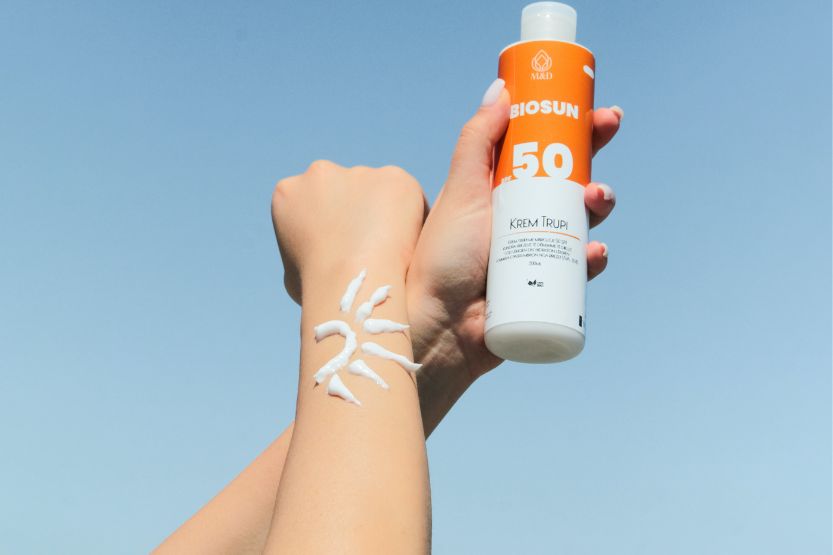
Wearing sunscreen is always a good idea for the whole family! While it may be tempting to skip the step of applying sunscreen, it is so important to protect your body from the sun. And wearing sunscreen is important year-round, not just during the summer! But it’s essential during the summer since the sun is stronger.
According to the American Cancer Society, it’s important to purchase sunscreen that includes “broad spectrum protection” on the label. Broad spectrum protection protects your body from both UVA and UVB rays which can cause skin cancer.
It’s also important to check the SPF (sun protection factor) on your sunscreen bottle. The American Cancer Society says you should only purchase sunscreen with an SPF of 30 or higher. And make sure you pay attention to the expiration date on the bottle. You never want to use expired sunscreen.
As you apply sunscreen, don’t forget the easy-to-miss places! Apply sunscreen to your ears, lips, tops of your feet, and hair parts! Once you have applied sunscreen, make sure to watch the clock! If you’re going to be outside for an extended time, you need to reapply sunscreen every 2 hours. While many sunscreens say “water resistant,” that doesn’t mean they are waterproof. Sunscreen will come off over time as you sweat or are exposed to water.
While you may want to achieve that summer tan quickly, it isn’t worth exposing your skin to a sunburn, early aging, or skin cancer! So, soak in the sun as safely as possible and take time to apply and reapply sunscreen!
Wear Sun-Protective Clothing
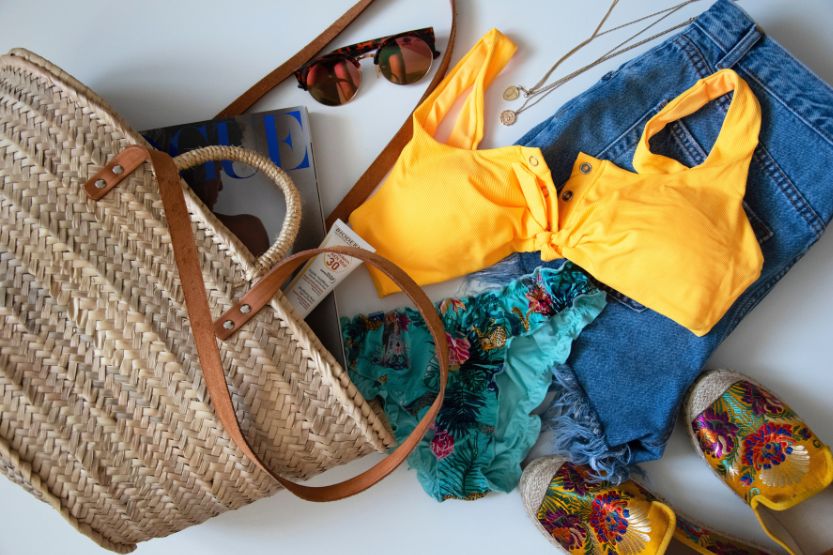
In addition to wearing plenty of sunscreen, wear sun-protective clothing to protect your body from the sun. Whether enjoying outdoor sports, a day on the boat, family picnics or working outside, wear sun-protective clothing along with sunscreen to help protect your body from the sun. It’s important to make sure you wear sun-protective clothing that meets the appropriate guidelines for protection from the sun.
“A fabric must have a UPF of 30 to qualify for The Skin Cancer Foundation’s Seal of Recommendation. A UPF of 30 to 49 offers very good protection, while UPF 50+ rates as excellent.” – Skin Cancer Foundation
When selecting clothes to protect your body from the sun, The Skin Cancer Foundation tells us that darker or brighter colors absorb more UV rays than lighter colors. Looser fabrics are also a better choice. Tighter fabrics can stretch throughout the day, allowing more UV light to break through the fabric and reach your skin.
Types of Sun-Protective Clothing
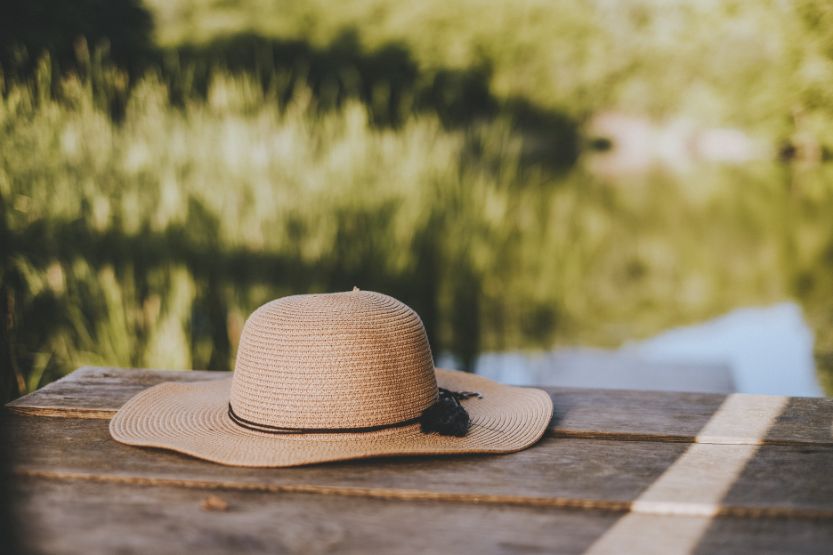
If you love to exercise or play sports outside, consider wearing UV protective clothing like lightweight, long sleeve shirts and joggers. Wear sun-protective clothing that protects more of your body from the sun without worrying about reapplying sunscreen throughout the day.
Consider wearing sun protective gloves if you work outside or enjoy gardening daily. While you may not think about it, your hands are just as susceptible to the harsh UV rays! Wearing protective gloves is even a good idea if you enjoy gel manicures!
Hats are a great way to protect your neck, face, and scalp from the sun! Not only do they protect you from the UV rays, but they also help keep you cooler throughout the day. So whether you enjoy a day on the water, hiking, or gardening, sun hats are stylish and smart!
Rash guards or swim shirts are perfect for a day at the pool, beach, or lake! Purchase one in multiple colors to easily coordinate with all of your swimsuits. Rash guards are also great for protecting kids while playing in the sun! Their breathable fabric helps keep kids cool in the heat and moves easily as they play.
Sun-Protective Clothing
Drink Plenty of Fluids
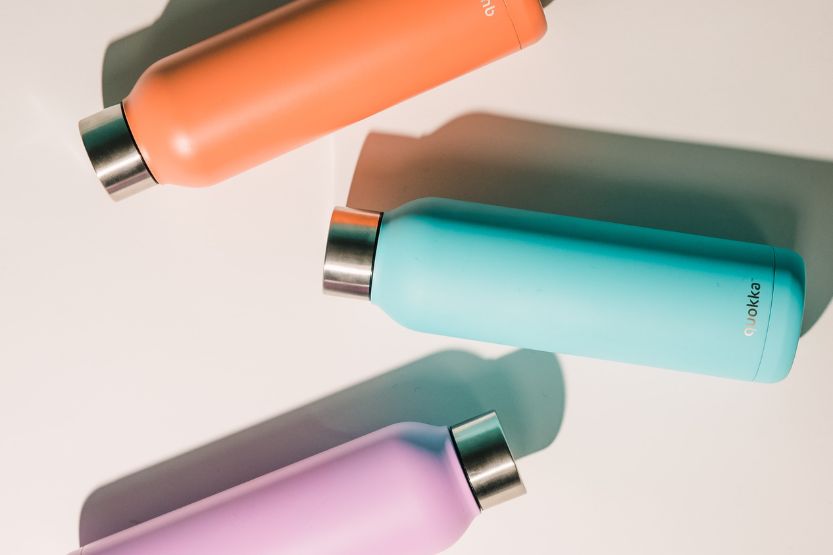
While it’s important to protect your body from the sun by applying sunscreen and wearing sun-protective clothing, staying hydrated while in the sun and heat is equally important. A study by the Mayo Clinic recommends 15.5 cups of fluids each day for men and 11.5 cups of fluids each day for women. While working in the heat, the CDC recommends drinking a cup of water every 15-20 minutes.
According to the Centers for Disease Control, “Drinking enough fluids is one of the most important things you can do to prevent heat illness. Water is generally sufficient for hydration.” When outside in the heat, it’s important to drink smaller amounts of water throughout the day instead of more significant amounts at once. And it’s extremely important not to drink more than 48 ounces of water in one hour. Drinking too much water at one time can cause the salt in your blood to become too low.
While water is ideal for staying hydrated on a hot day, sports drinks offer hydration with added electrolytes. However, it’s important to pay attention to the amount of sugar in the sports drink. And while a cocktail by the pool is refreshing and relaxing, alcohol can cause dehydration, so it’s important to drink plenty of water and watch alcohol consumption while in the heat.
So the next time you prepare to head outside for an extended time, remember to hydrate before, during, and after to help you stay safe in the summer sun!
Protect Your Eyes by Wearing Sunglasses
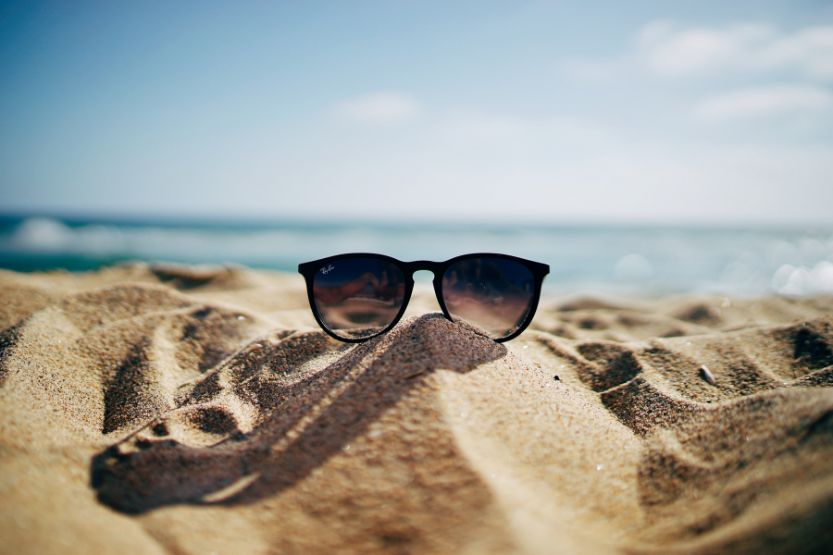
UV radiation isn’t only harmful to your skin; it can also harm your eyes! Without proper eye protection, the sun can cause premature aging to the skin around your eyes, cause cancer on your eyelids, and cause eye conditions including cataracts, eye cancers, and macular degeneration. Protect your eyes by applying sunscreen on the skin around your eyes and wearing sunglasses.
You can even get a sunburn on your eyes! This condition is known as a corneal sunburn or Keratitis. It occurs when your cornea has too much exposure to UV light. Keratitis is especially common around water or snow due to the reflection off of their surfaces. Since you can’t put sunscreen in your eyes, how can you protect your eyes from the sun?
Skincacer.org recommends wearing sunglasses that block 99 to 100 percent UVA and UVB light. Wear sunglasses any time you are going to be out in the sun, no matter what season it is. It’s also important to take extra care of your eyes when at a higher altitude since UV rays intensify at a higher altitude. While you may think you don’t need to protect your eyes on a cloudy day, think again. The sun’s rays can still get through clouds, causing a sunburn to your skin and eyes.
Stay in the Shade
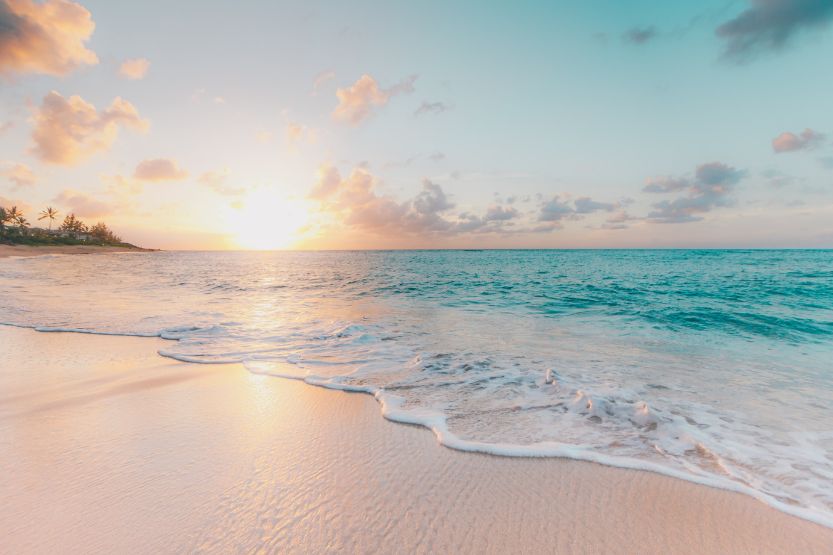
Whenever you are outside, try to find shade. UV Rays are strongest between 10 am and 4 pm. And while our 4 tips above will help protect your body from the sun, finding shade throughout the day is a great way to cool off and stay safe in the summer sun.
Pack a tent or umbrella to provide shade throughout the day when heading to the beach. If you are spending the day at the park, find a shady tree to picnic under for a break from the sun. When exercising outside, take multiple breaks in a shady spot to give your body a break from the direct sunlight.
Taking time to apply these 5 tips will help protect your body from the sun and help you stay safe in the summer sun! However, the heat can sneak up on you, and it’s important to know the signs of heat exhaustion and what to do. Check out this article from the Mayo Clinic on the signs and symptoms of Heat Exhaustion.
How do you stay safe in the summer sun? Do you remember to protect your eyes? Comment Below!







Leave A Comment